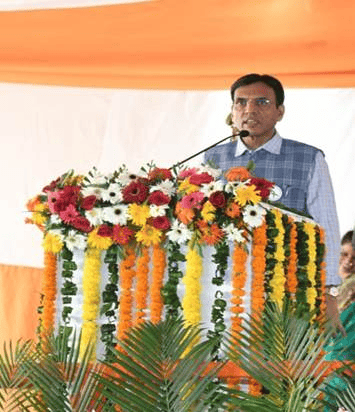GG News Bureau
New Delhi, 16th Sept. Union Health Minister Dr. Mansukh Mandaviya on Saturday led a pledge for Organ Donation at the GIC Ground, in Agra.
Prof. SP Singh Baghel, Union Minister of State for Health and Family Welfare and Brajesh Pathak, Deputy Chief Minister and Minister of Medical Education, Uttar Pradesh also joined virtually.
Yogendra Upadhyay, Minister of Higher Education, Uttar Pradesh and Baby Rani Maurya, Minister of Women’s Welfare, Child Development and Nutrition, Uttar Pradesh were also present.
Around 8,000 people took the pledge to donate organs in Agra on the occasion.
Addressing the gathering, Dr Mandaviya said that there can be no greater service to mankind than donating organs to save another life.
He gave a clarion call to “donate blood when alive and donate organs after death”.
Underlining the need for regular medicines and check-up after organ transplant, the Union Minister said that “the government has decided to give financial assistance of Rs 10,000 per month to all the poor people undergoing organ transplant”.
“Arrangements will also be made for their regular check-ups”, he further stated. He also informed that by the end of 2024, arrangements for organ retrieval will be made in all the hospitals and medical colleges of the country.
The Union Health Minister also inaugurated a super specialty block at Sarojini Naidu Medical College, Agra, and an organ donation registry.
To register to donate organs, the only requirements are the Aadhar number, and the Aadhar linked mobile number.
He also laid the Foundation Stone for 23 Integrated Public Health Labs, and 87 Block Public Health Units in Agra on the same day.
Dr Mandaviya highlighted that the super speciality block at Sarojini Naidu Medical College (SNMC) is constructed in an area of 7,890 sq. meter at a cost of Rs. 200 crores.
He stated that the facility in SNMC will cater to around 3 crore people in not only Agra but also 11 districts and two surrounding states.
He also informed that the super speciality block at SNMC will include services like neurosurgery, neurology, gastroenterology, gastro surgery, urology, nephrology, cardiology etc.
Dr Mandaviya also said that under the leadership of Prime Minister Narendra Modi, India has taken several landmark initiatives to increase the healthcare workforce as well as to improve and expand healthcare infrastructure in the country.
Through a video message, CM Yogi Adityanath said that the government under the leadership of Prime Minister Narendra Modi has always given utmost importance to the health and wellbeing of citizens.
Appreciating the organ donation pledge initiative, he said that “donating one organ can give a new lease of life to another person”.
He encouraged the gathering to take the pledge to donate their organs so that the message reverberates across the country.
Prof S P Singh Baghel highlighted the importance of organ donation in saving the lives of people.
Regretting that only 2% people in the country are able to get access to organ implants in the country, he stated that he and his family members have also taken the pledge to donate their organs and urged everyone to do the same.
This was followed by a ‘Seva Pakhwada’ for saturation of essential health services which will run from September 17th to October 2nd, 2023.
The ‘Ayushman Bhav’ campaign which was inaugurated by President Droupadi Murmu, on September 13, 2023, that aims to redefine healthcare accessibility and inclusivity across the country will be implemented during the ‘Seva Pakhwada’, embodying a whole-of-nation and whole-of-society approach.
The core objective of the Sewa Pakhwada is to extend comprehensive healthcare coverage to every village and town, transcending geographical barriers and ensuring that no one is left behind.
This synergistic approach aims to saturate coverage of health services through its three components Ayushman – Apke Dwar 3.0, Ayushman Melas at Health and Wellness Centres (HWCs) and Community Health Centres (CHCs) and Ayushman Sabhas in every village and panchayat:
Ayushman Apke Dwar 3.0: This initiative aims to provide Ayushman cards to remaining eligible beneficiaries enrolled under the PM-JAY scheme, ensuring that more individuals have access to essential health services.
Ayushman Melas at HWCs and CHCs: These Melas at Ayushman Bharat- HWCs and CHCs will facilitate the creation of ABHA IDs (Health IDs) and issuance of Ayushman Bharat Cards. They will also offer early diagnosis, comprehensive primary health care services, teleconsultation with specialists, and appropriate referrals.
Ayushman Sabhas: These gatherings in every village and Panchayat will play a pivotal role in distributing Ayushman cards, generating ABHA IDs, and raising awareness about vital health schemes and disease conditions, such as non-communicable diseases, tuberculosis (Nikshay Mitra), sickle cell disease, as well as blood donation and organ donation drives.
The Ayushman Bhav campaign aims to ensure saturation coverage of all health schemes.
It unites government sectors, civil society organizations and communities under a common mission to ensure that every individual receives essential health services without any disparity or exclusion.


Comments are closed.